Chris Baty's Blog, page 229
October 2, 2012
NaNoWriMo Relaunches!
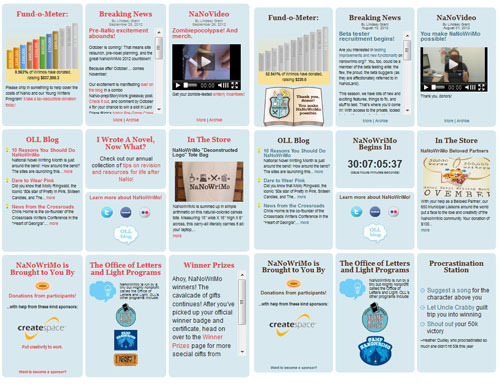
This year, there’s a lot of sparkle over on the newly updated nanowrimo.org.
We hope you enjoy poking around the site as much as we have enjoyed getting it ready for you! And if you encounter anything ugly, broken, or questionable, please report it over in the Tech Help & Site Bug Reports forum.
As you can see from the above screen shots, one of the more noticeable changes to the overall look of the site is the more restful, less-shouty header and link palette.
In the newly updated History section, I reminisce about the site rebuild of 2011, and our first draft of the Rails-built website. It ran fast and true, but we spent much of 2012 revising and adding to it.
And voila! Now we’re one draft closer to where we want to be.
We’ve got new badges and pep talkers, an improved profile layout, enhanced forums preferences with signatures and customization options… the list goes on and on.
Over in the store we have great new noveling goodies and some fun new features: rounding up your order for extra noveling karma, recurring monthly donations, and an option to choose-your-own-donation-amount!
And for the first time ever, 2012 winner shirts are on sale early in unlimited quantities from now until October 15! Get yours now to fully commit to winning this year; and this way, you’ll know that you’ll have it in time for your TGIO party!
Aside from playing on the newly updated site, what does October have in store for you?
— Lindsey
October 1, 2012
10 Reasons You Should Do NaNoWriMo

National Novel Writing Month is just around the bend! How around the bend? The sites are launching this week; that’s right, this week. Are you unsure about committing to writing a novel this November? Are there people you want to convince to join the world’s biggest writing event? Or do you just need to explain why you’ll be writing a novel this November?
You’re in the right place, because we have ten great reasons why you should do NaNoWriMo:
1. Because you get this deep down feeling in your bones after you read an amazing story; a need to drop everything right then and write something, too. Because every once in a while, while riding your bike, you mull over the dream you had last night and suddenly wish you were being chauffeured so you could whip out a pen and jot that bit of dialogue down and see where it takes you.
That feeling isn’t going away, is it? It’s because your spark of inspiration feeds off an inexhaustible fuel. There are people out there who think, ‘That would make a decent story,’ and then never bother themselves about it again. They are a credit to their parents in many other ways, but they don’t have the particular fire that burns in you. Don’t waste your light.
2. You’re afraid to try. Here’s the thing, ‘afraid to try’ is, like, the next-door neighbor of ‘want to try’. Heck, they’re basically roommates. ’Don’t want to try’ is actually four counties over.
As much as we talk about the guilt monkeys that will plague you during the month when you let your word count languish, if December 1 rolls around and you haven’t reached 50,000 words, they are surprisingly compassionate. They will pat you on the shoulder. They will point out that you’ve written 100 words more than you would have if you hadn’t bothered. They will stroke your hair.
That last one isn’t out of compassion, but hunger. Still, it’s nice.
3. You have an idea.
4. Everyone agrees that November is a totally boring month; worse than August. Mostly, there is absolutely nothing of worth happening. “What about Thanksgiving?” I hear many of you asking. Fun fact: the only other country that even celebrates Thanksgiving is Canada, and theirs is in October.
“But I’m so busy with school/work/other!” others of you cry out. I, too, used this reasoning once, to convince my mom that I had absolutely no spare time to play the piano at her dance class’ rehearsals.
Her reply? “Let’s talk about how little time you’d have if we sent you out to your cousins in Korea, and you were engaged in rigorous academic study from seven in the morning to nine at night.” Turns out I had a couple hours, actually, to plunk out waltzing triplets.
All joking aside, November can be a tough month to find the time to write, but the only way to guarantee that you will not have time to write a novel is to make no attempt to look for it.
5. You love writers. NaNoWriMo comes with a community of a quarter million creators like you, who will be breathing life into their characters by your side. On October 31, you can feel a collective inhale starting in New Zealand, and traveling west across the globe, and then a whoosh when November 1 hits. It is epic. It is awesome.
When I spend a lot of time with bro-ier friends, I start speaking the language, complete with a strong peppering of ‘dude’, ‘sick’, ‘swole’, etc. We are influenced by the people we surround ourselves with. Sometimes, this doesn’t work out for the better (as my example could demonstrate; your mileage may vary). With the right people, though, it can be very real and uniquely human magic power to compile individual resources of will into one giant pool to push each other to achieve the improbable.
6. Do you hate pep? Are encouragement and optimism and persistence distasteful to you? Do you wrinkle your nose at can-do spirit? Good news! We have a place for you over here in the quiet corner, where you can steadily write, consult your stats, and self-motivate to your heart’s content.
Everyone else, brace yourself for advice from published authors, tips and relevant anecdotes from NaNo HQ, word sprints run by your MLs, and pop culture references galore. (We cannot promise these references will be either up-to-date or cool. I will, however, spare you the rendition of ‘Write Me Maybe’ that we belt in the office.)
7. If you are in the Southern Hemisphere, and are hoping to avoid sunburn and the possibility of skin cancer, let me introduce you to the indoor sport we call NaNoWriMo!
If you are in the Northern Hemisphere, and hoping to avoid snow, rain, general chilliness, haaave you met NaNo?
8. There are people out there who will say, “NaNoWriMo is a waste of your time.” Sometimes, they will go on to say, “You cannot write a novel in a month, and any first draft that comes out of a rush to pen it in 30 days will be completely useless to you.”
If you are a patient person who would like to engage these naysayers, there are two responses to this sort of person, which depends on how they answer the question: “Have you ever written a novel?”
If they say, “No, I have not completed a novel,” you are allowed, even encouraged, to pause, smile kindly and say, simply, “Interesting.”
If they say, “Yes, I have completed a novel,” you might say, “That’s fantastic. High five—come on, up top! I think this is how I’m going to push myself to do something I’ve always wanted to do, like you did. I don’t know if I’ll end up trying to publish a novel, but if I do, I know writing one is the first step towards doing that.”
If you are not patient, a pretty solid response is, “Cool, I think I’m going to do it anyway.” There’s a decent amount of satisfaction to be found in openly disregarding the haters.
9. Because you have a story worth telling. First, here is what we’re not entitled to: being listened to by the masses. The honest truth is that attention is earned. But there can be incredible epiphanies that come from telling yourself your story. There are so many possibilities inside you. It’s a worthy thing you do, exploring those paths.
Everybody starts with an audience of one, and nobody has the right to silence you, not even your own inner editor.
10. You love to write.
Tell us your reasons for doing NaNoWriMo!
Photo by Flickr user owlbookdreams
September 28, 2012
Dare to Wear Pink

Did you know that Molly Ringwald, the iconic ’80s star of Pretty in Pink, Sixteen Candles, and The Breakfast Club, is also a literary fiction writer?
Seriously.
Recently, I attended a reading of her new short story collection When It Happens to You. I’ll admit it—I mainly showed up because she was an icon of my teenage years. Because of her, I almost resorted to sewing my own prom dress. My mom had the good sense to convince me otherwise; I had neither a sewing machine nor fashion sense and the dress was starting to look like a belly dancer’s costume.
Flash forward to this year, when I found out that Molly Ringwald had recently published a collection of fiction stories, and my adolescent idol gained about another million degrees of coolness.
She read from “My Olivia,” her haunting story about a mother struggling with a transgender child. The audience was almost brought to tears by her words; not a screenwriter’s words, or a director’s words—her own words.
San Francisco Litquake’s Jane Ganahl grilled her with questions on topics ranging from her Brat Pack days to her book reviews to her gorgeous Greek husband sitting in the audience. But one answer really stuck with me:
“I’ve been writing for decades. It was singing, writing, and acting in that order, and once acting took over, I kept writing and never thought that it would be possible to ever be taken seriously as a fiction writer. That’s what kept me from [fiction writing & publishing] for so long. But in the end I feel like the writing speaks for itself.”
Molly Ringwald worries that people will not take her seriously as a writer.
It’s a worry that crosses my mind every time I tell someone that I am a fiction writer. I always expect the next question to be: well, what have you published? Or what kind of person spends their days transcribing the thoughts of imaginary people? Or did you know that a writing career doesn’t come with stock options?
I, uh, you know, it’s just…
Everyone faces the doubt of announcing themselves as “real” writers. Sometimes we hide our “writer” status for fear of ridicule or dismissal. Do you love to write? Yes. Do you put pen to paper in a magic string of ink straight from your heart? Yes. Then, stash the self-doubt, apply a little pink lipstick (this step is optional), and dazzle the world with your talent.
Whether your day job is as a doctor, actress, lawyer, or waitress, tell the world, “Yes, I am a fiction writer.” And then take that one step further, “Yes, I am writing a novel in one month. Seriously.”
Have you ever been afraid that the world might not take you seriously as a writer? Have you ever let it stop you from writing? I’d love to hear your stories!
— Andrea
Photo by Flickr user Chris Mc Robert
September 26, 2012
News from the Crossroads
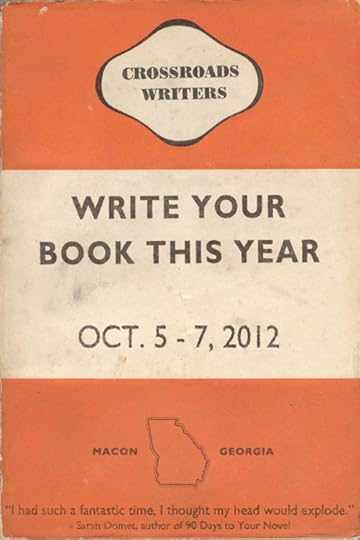
Chris Horne is the co-founder of the Crossroads Writers Conference in the “Heart of Georgia”, also known as Macon. Besides featuring our beloved Chris Baty as a keynote speaker at the conference, the fine folks at Crossroads will also be donating part of their proceeds to the Young Writers Program.
Crossroads engages in many inspiring community projects, including their Sidewalk Stories, which will replace gray sidewalks with ones adorned with poetry, lyrics, history, quotes and other literature. Chris loves writing, and values community even more; he shared his thoughts on both, and why it’s so important to teach young writers that you can make a living being creative (remember to flip the voice box to a Southern drawl):
Have you participated in NaNoWriMo before? Did you furiously type out a 50,000 word novel?
I’ve done it twice before, and my best outing was last year with a little more than 40,000 words. This year, I’m doing it and my wife is joining me. We’re going to push each other!
What inspires you about NaNoWriMo?
First, the sheer challenge of it. And thus far, the fact that I haven’t been equal to the task. Between the first time I tried it and now, I’ve learned that what makes NaNoWriMo special is that it makes me practice two things I’m terrible about doing otherwise: 1) writing daily and 2) delaying the editing process until I’ve written as much as possible. It’s also really helpful for learning how to just follow the story.
Were you a young writer? Tell us about your early masterpieces.
Though I didn’t know I could be a writer, I wrote often—more after a middle school teacher encouraged me. In second grade, I plagiarized “The Tiger” by William Blake because it was in a book we had with great illustrations.
In third grade, I was less picky with my sources of inspiration, doing a (very short) movie novelization for my then favorite horror film, House, starring William Katt of Great American Hero fame. So I went very quickly from William Blake to William Katt and I haven’t done much better since.
Why did Crossroads decide to donate some of its proceeds to the Young Writers Program?
When I was young, I never daydreamed about being a writer, and only until I was actually making a living as a journalist did I ever consider being a writer as a possibility. The other side of that is true, too. Plenty of kids (and adults) think they can get famous as a novelist or a screenwriter or a musician. “The Dream” is often oversold and it becomes a sort of ultimatum, like you either make it or you don’t.
The reality is that you can make a living being creative. So my philosophy now is that the sooner we can help young folks grasp that reality, the better qualified they’ll be to explore their options and, at the least, understand how valuable writing can be no matter what they end up doing.
How important is a community to succeed as a writer?
Crossroads has a lot in common with NaNoWriMo in that we are big believers in community. Writing can be such a lonely job, but when you’re connected to other writers, you’re open to more knowledge, more motivation, more fun. So everything that comes out of the Crossroads Writers Weekend is generally tied to the community of writers, whether that’s connecting to professionals or other attendees.
Why did Crossroads choose Chris Baty for the conference? Was it for the cachet brought by having a very tall person there?
Macon is blessed to have a bona fide member of the OLL team here, Heather Dudley. She started helping with Crossroads last year and when she said she thought Chris Baty was even a possibility, we jumped at the chance. We were aware he’d never had an official trip South and thought it’d be a great opportunity for regional Wrimos and the uninitiated alike to meet the man and participate in his inspirational message.
The Crossroads Writers Conference takes place from October 5-7, 2012 in Macon, Georgia. You’ll be sure to find a heart full of writers there.
— Andrea
Photo courtesy of Crossroads Writers Conference.
September 24, 2012
Pre-NaNo Go Time

The season is nearly upon us! NaNo approacheth, ready or not.
The office is all abuzz as we work behind the scenes to get nanowrimo.org; OLL’s online store; and all noveling resources for classrooms, MLs, and our bookstore and library partners ready for site relaunch and the November noveling madness beyond.
But site, store, and resource-readiness doesn’t necessarily mean I’m mentally and emotionally prepared to start writing my next novel in just over a month. How about you?
I realized it this Tuesday when visiting with the Central Coast Writers in Monterey, California. They are a massively talented group, with writers ranging in backgrounds from journalism to self-publishing to education. I loved hearing about their writing practices and passions and what got them excited—and ready—to write.
As I stood there, talking to them about how we at NaNo prepare to write a novel in a month, I realized I need to take a page out of my own proverbial book and start preparing myself for the onslaught of words, plot twists, plot holes, characters flaws and details about to come raining down on this book-loving brain of mine.
Let’s try the following together to get as ready as possible for the season of the novel:
Talk to other writers. Like the writers at CCW do, having a go-to-group to talk noveling with will help you loads as you mentally prepare to write at high velocities. Whether you’re a plotter and are outlining every chapter, character arc, and storyline of your novel; or you’re a pantser who plans to jump in feet first with no more than a wink and a prayer, lean on that group of fellow writers for support, encouragement, and inspiration!
If you’re not sure where to find other writers, head into the NaNoWriMo forums and start posting! You’ll get more replies that you can shake a stick at!
Tell friends and family and neighbors and coworkers what’s on the horizon. They too should mentally prepare themselves for your month of creative abandon… emphasis on abandon(ed), which is what they may feel when you disappear for all of November. They can also hold you accountable once they know that you’re working toward such a challenging and commendable goal! Support groups take many shapes and forms, and having this core group on your side will help tremendously come November 1 (and 2, and 3…). Cheering section assemble!
(If you’re a plotter) Start plotting! If you already have a character, or a few in mind, or a possible direction for your plot, get planning! Ready, Set, Novel, a workbook for writers, can certainly help (especially if you have no clue in the world what you want to write about).
Write! No, don’t start writing your novel yet. Just start writing in general. In Monterey, the CCW and I did a micro-writing exercise: three-minutes-worth of free writing about three randomly selected subjects. It was so much fun. Just three minutes a day for the next few weeks will get your brain in gear and your hands in shape for the guerilla-style literary throwdown to come.
Comment below, sharing your most effective pre-noveling prep routine, and you’ll be automatically entered to win one of two slots in the ultimate pre-NaNo prep-a-thon: Lani Diane Rich’s StoryWonk NaNo Pre-Game Class. (Make sure to include your site username so we can alert you when you win!) We’ll announce the winner on October 4, so please be sure to add your comment by then!
Happy prepping,
Lindsey
Source photo by Flickr user robenjoyce
September 21, 2012
The Inspiration Diaries: Kevin Kaiser <3s J.J. Abrams
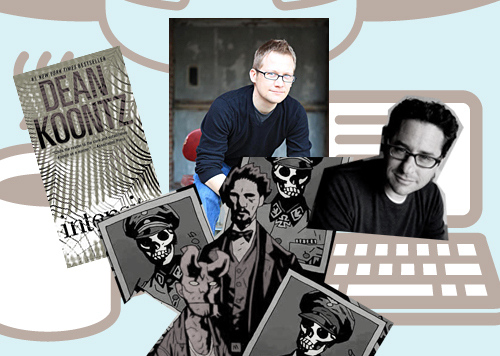
As we ramp up towards November, we here at HQ are finding inspiration everywhere. It’s so much on our minds, that we’ve asked some friends of NaNoWriMo to keep an Inspiration Diary, and share where their plot bunnies are roaming thickest.
First up? Kevin Kaiser, whose new guide to writing a novel in 30 days, @WriMo , is coming out on October 1:
Right now, I’m co-authoring a series of novels with a writer who has thirty-some odd titles to his credit. A typical day gobbles up everything in the imagination tank. Turns out, I need a constant flow of inspiration to keep going, and I usually stumble on it in places both unlikely and pop-cultured.
6:46 a.m. Morning walk through the neighborhood. Walks are underrated; motion gets the imagination cranked up.
Halfway home, a tailless squirrel scampers into the street. Stops, stares at me with black, marble eyes. I’m pretty sure he’s jonesing for a fight. He’s also missing part of an ear. Bad news. I back away and take another way home.
7:17 a.m. Epiphany in the shower: pitch the idea of a demon squirrel during storyboarding session with my co-author later this morning. It’s perfect, oh so perfect.
8:01 a.m. Enjoyed breakfast, but the brain’s running on fumes. A local espresso roast from Drew’s Brews fits the bill. As every writer knows, the seeds of inspiration are best nourished with a steady flow of caffeine.
8:24 a.m. Music! Bring me music! What is this? A new video of Mumford & Sons at Red Rocks is on YouTube? Yes, please. Can’t wait for this album. Can’t. Wait.
12:43 p.m. Morning storyboarding phone call ends. Amped up, but my brain feels like a wet towel that’s been wrung out. Time for lunch and some more music. Gotta keep those juices flowing (links go to Spotify):
Citizen Erased by Muse
Uprising by Muse
Too Close by Alex Clare
1:20 p.m. I stare at my computer screen, unable to form a coherent sentence. More music. When I write I either need full-on silence or soundtracks. Today’s genre of choice: Epic. I crank up the afternoon playlist medley and thumb through my Turn of Phrase Book in search of some cool ways to describe a sunrise.
The Avengers soundtrack by Alan Silvestri
The Dark Knight soundtrack by Hans Zimmer
Inception soundtrack by Hans Zimmer
3:47 p.m. Gazing out the window, letting my mind wander. Sometimes it circles back on itself, other times it comes across a nugget of an idea.
Tailless squirrel is across the street watching my house. Note to self: Do not leave the house tomorrow. And no, of course the squirrel isn’t the product of a wandering imagination.
4:15 p.m. Completely torched so I retreat to man’s greatest literary invention: comics. I bust open B.P.R.D.: 1947, Issue #1. Mike Mignola possesses so much genius. After finishing the first issue, I promptly devour the next four in quick order and make another note on a Post-It: Scratch demon squirrel idea. We need a hell spawn. Something bigger. A wolverine or maybe a man-sized opossum.
6:32 p.m. My wife and eight-year-old daughter head out to a young reader’s book club. I have the house to myself so I take in a few episodes of the second season of Fringe. It’s one of the most underrated shows out and I wish it were sticking around.
9:15 p.m. Grab a snack and settle in for a movie date with my wife. Super 8 by J.J. Abrams. It reminded me of how I felt when I first watched E.T., which is what I think he was going for. Nostalgia.
If it’s OK to have a man-crush, mine is J.J. Abrams. When I was in SoCal last year for a book tour, I went out of my way to find the Bad Robot production studio just so I could get a picture in front of it. True story.
Inspired by the brilliance in Super 8, I tee up J.J. Abrams’ TED talk on storytelling as a “must watch” for the morning. I’ve seen it maybe a dozen times already, but who’s counting? It’s J.J. after all.
11:46 p.m. Wind down the night with some light reading. Intensity by Dean Koontz, which is, in my opinion, the consummate thriller by a consummate wordsmith.
Stephen King is right, all writers need to read as much as they can. Gotta make more time, I think; tomorrow’s another day.
Kevin Kaiser is a writer and producer. His latest project, @WriMo: A 30-Day Survival Guide for Writers, is a book designed to help NaNoWriMo participants stay inspired during the month of November. 100% of the profits from the book go to supporting NaNoWriMo and other writing programs.
Keep up with Kevin:
On his blog
@kevinskaiser
On Facebook
September 19, 2012
Niall Leonard Crushes NaNoWriMo
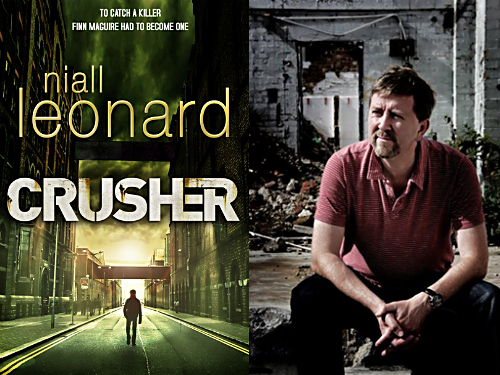
Like many people, Niall Leonard, had been “loudly promising a novel for a very long time.” As a professional TV writer, something else always seemed to come up, or he’d decide his idea for a novel had narrative problems. After watching his wife, E.L. James (yes, that E.L. James), write a novel, he gave NaNoWriMo a whirl in 2011.
Forget about those narrative problems. Last November, he finished the first draft of his novel, Crusher , which has just been published by Random House.
Read on as Niall tells us about writing screenplays vs. novels, outlining stories as shopping lists, and writing for yourself.
Since you were already a
Writing for TV can be restrictive—you have to hit the slot length and ad breaks, ration the strong language, think of the budget—and you have to tailor your vision to the producer’s concept of what’s good and what works. If you want freedom to tell your own story your own way, you have to write a novel.
On the other hand, all that freedom can be so scary you don’t know where to start, and without a producer on your back it’s all too easy to faff around with ideas for months on end without actually writing anything. That’s where NaNoWriMo can come to the rescue. It certainly did for me.
You’ve mentioned that you were “learning, and relearning, an awful lot” during NaNoWriMo. Can you tell us more about what you learned and relearned?
All the stuff I learned and relearned was the stuff that NaNoWriMo participants are familiar with—that you should just write it now and polish it later, that a writer’s search for perfection can be self-defeating, and that waiting for a brilliant idea gets you nowhere; that you have to seize the day, and if you have a problem, to think of a quick solution and keep going; that your audience wants you to succeed, to entertain and transport them, and they’re not always as worried about holes and coincidences as you are; that the most humdrum idea written down beats the most sublime idea in your head, every time… you want me to go on?
What’s your writing process like outside of NaNoWriMo? Do you write 1,667 words a day?
I personally can’t write 16 words a day unless I know where the story is going. I know some people make it up as they go along, but I have tried that and I have always run out of steam and ended up lost and demoralized.
Before I start a project, I spend time thinking about it and what sort of story it is, sketching characters, their stories and how those stories unravel, their secrets and how those secrets are revealed. Then I write a quick, dirty outline weaving those elements together—it looks like a shopping list. When I feel that it mostly makes sense, I am ready to go. I don’t know what happens in every chapter of the story before I start, I just need to know where I want to end up.
I’ve always had that approach to writing. It helps when you are working in TV, and it helped me last November. Back then I aimed to write at least 2,000 words a day, and having a plan made that easier. Right now I’m in the planning stage for Crusher II. The only problem is I’m so busy plugging Crusher I!
After finishing NaNo, you wrote that you didn’t know if your novel was any good or not. What went into the revision to make the book good enough to sell?
I felt instinctively Crusher was solid and worked the way I’d wanted it to, and I was delighted I’d written it, but I wasn’t going to go around telling everyone it was good enough to publish. I kind of hoped it was, and planned to sit down in March, reread it and revise it, then maybe self-publish it as an ebook. But events overtook me. My wife’s publisher got hold of a copy via my agent, and they felt it was pretty much ready to go, and I certainly wasn’t going to argue.
There weren’t many big fixes to be made, although my first proofreader pointed out that the way time passed didn’t work—the way shops and schools and government offices were operating day after day. I had written ten weekdays in a row, with no weekends. That fix took some figuring out.
Also challenging to deal with were the clearances for the poetry and lyrics I had copiously quoted in the script. I knew quoting copyright stuff could be a problem, but I thought it didn’t matter because Crusher would probably never see the light of day. (The publisher, if you get one, won’t cover you if you breach anyone’s copyright—it’s your problem, not theirs.) Fortunately, once I had tracked them down, the rights holders were very helpful and generous.
As a fan of The Sopranos and The Wire, did TV shows influence Crusher, especially since it’s a “gritty thriller”?
I have thought about this and the only parallel between Crusher and The Sopranos is the figure of the rough-hewn mob boss who lives in a huge, glossy suburban mansion. I have always gone for grit and grime and dark places when I write thrillers. I wouldn’t know what else to portray. Chases on foot through luxury hotels and London’s top tourist attractions? I’ll leave that stuff to Hollywood.
We hear you’re planning to write the sequel to Crusher this year during NaNoWriMo. Will your NaNo writing strategy change for a sequel?
If it ain’t broke…
We have to ask this since you’re married to E.L. James, the author of Fifty Shades of Grey. How does being married to a famous writer influence your own creativity?
For the better, I think. She was working as TV executive, and wanted to write. One day she sat down and started, and she kept going, and the more she wrote the better she got. My being a professional writer actually worked against me—I used to tell myself, well, I’ve got nothing to prove, my work is on prime time TV. And that was true. But she was the one having fun.
Don’t get me wrong, she worked really bloody hard, but what kept her going was that she loved doing it, and I envied that. I wanted to be like her, to work hard writing something for myself and have fun. And thanks to NaNoWriMo, and her pushing me into it, I did.
You can keep up with Niall:
On his blog.
@Noghar
And here for more information about Crusher.
September 18, 2012
It's NaReFriVoNaChaCoDa!
We’ve had such an incredible response from Wrimos to the Chase Community Giving contest, and we can’t thank you enough for your votes.
We need to kick things up a notch, though, if we want to break into that top 11 and be eligible for the $100,000 prize. And so we’re declaring today Recruit a Friend day. We’re asking our Wrimos to ask their friends and family to help us out.
Take a moment today to share what NaNoWriMo means to you, and why a vote is so important to our small organization. If everyone who has voted so far told two friends who then voted in turn, we would skyrocket into that top 11 and the associated $100,000.
What do you say? Can you find two friends to help us out? Share your NaNoWriMo story on Facebook, Twitter, Tumblr. Tell everyone you know about the contest and ask them to help an organization that means a lot to you.
Let’s call it National Recruit a Friend to Vote for NaNoWriMo in the Chase Contest Day. NaReFriVoNaChaCoDa just rolls off the tongue, doesn’t it? You can even sing a little song about it! “NaReFriVoNaChaCoDaExpealidocious!” Catchy, no? I mean, it’s no NaNoWriMo, but then, what is?
— Sarah
September 17, 2012
The Mechanics of Language, or How I Stopped Worrying and Learned to Love the Fragment

When I was a kid, I had a friend who wrote constantly. Every day—usually prose poetry. This kid knew how to write. He wrote phrases I still remember off the top of my head. Sentences like: “Maybe the future is a firework.” Words that, when strung together, bristled with surrealism and action. But he didn’t know how to write to the standards of Strunk and White.
He left dangling modifiers everywhere, carelessly strewn about like old socks. He spelled “garage” as “grodge,” a transgression that left me horrified. And it was hard for me to reconcile the magical quality of my friend’s writing with the casual blunders he made in every paragraph. Having proper grammar was a way for me, and a way for many others, I suspect, to feel as though my writing was worthwhile. But I had not reached a point where I could write with the freedom and imagination that my friend possessed.
One linguistics course in college turned this around for me. I was right about one thing, at least. Language is about communication. And when grammar is held in higher esteem than language, you get the lamest and least communicable sentences in the world. On the rule about ending a sentence with a preposition, Winston Churchill famously said, “This is the kind of tedious nonsense up with which I will not put.” It’s a sentence that parodies such rules about language, as it requires so much dissecting and rearranging for the sake of… what? Grammar? Please.
Writing has also taught me that language is about experimentation, which is at risk of being smothered when you spend so much time focusing on the mechanics. I’m recalling Shakespeare’s invention of words we use and recognize today. The majority of them are words that, like in my friend’s writing, feel alive with action (“remorseless,” “champion,” “negotiate”).
I’m still discovering new words all the time that make me feel this way. I came across the word “chantepleure,” which is just two French words mashed together. In archaic English it meant “alternately singing and weeping.” I loved it immediately because it was the perfect description of the blues. In modern day French, it refers to the the bottom of the wine press where the wine sings and weeps as it filters out. I loved it anew as a symbol of the metaphorical prowess of the French.
A while ago, I was in a music shop with a friend. The owner saw us come in and asked how we were doing. “I’m doing good,” I said.
“‘Doing well,’” he corrected, his eyes narrowing at me in that familiar way. Of course, I know the difference. I have used my little red pen against such phrases. I say, “I’m doing good” because it feels casual and friendly. People who use “I’m doing well” almost never seem to say it in a friendly way. In fact, I only ever hear it accompanied with those narrowed eyes.
Now that I’ve internalized the idea that good grammar doesn’t make me superior to others, I’m not as good of a copy editor anymore. I put on my copy editing hat when my job requires it; I make changes because someone else wants them, and not because I take personal offense at other people’s mistakes.
But this has allowed me to be inspired by language again, and that is very much within the spirit of NaNoWriMo. Write now. Edit later. I have rarely felt a thrill when copy editing that didn’t come at someone else’s expense, and that’s just not what good editing is about. When editing, it’s my job to make sure people get what you’re trying to say, not to make you feel bad. When writing, it’s my job to remember that I’m writing to share a story, and the spark of life that comes with it.
– Ari
Photo by Flikr user Dan Anderson
September 15, 2012
The OLL-iverse: Starlog 13
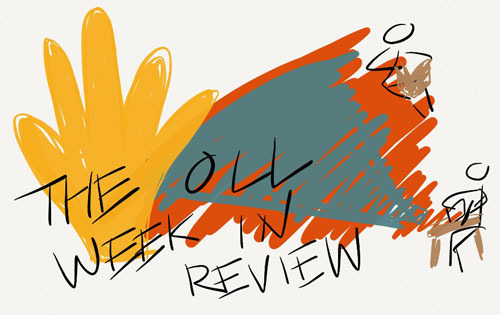
Hello friends! This Week in Review is brought to you by Ari, who had cheese for breakfast, cheese for lunch, and will soon be having more cheese as the office closes for the week (see below). So basically, cheese.
NaNoWriMo
We’ve entered the Chase Community Giving contest, and we’re moving up and up! We’re aiming to be in the top 11 by Wednesday; the top organization is awarded $250,000! This would be a huge deal for a small nonprofit like us. This is a great opportunity if you’re strapped for cash, but still want to show your support. If you vote, you’ll be helping us inspire even more people around the world!
Our Executive Director, Grant Faulkner brought in his son and daughter to model the newest YWP shirt for us. We had them high-fiving, flexing, and dancing in front of a brick wall while we snapping tons of pictures for the store page. It was a blast! Keep a lookout for these shirts in the store if you have a little Wrimo in mind!
Facebook & Twitter
@NaNoWriMo asked our followers this week: What ways has NaNoWriMo changed your life?
And this week’s writing prompt: What sort of charmed life would you lead with an extra $250,000? Entertain your most outrageous fantasies.
In the Office and Elsewhere
We welcomed our latest intern Andrea this week. You can check out her intro post here.
Sarah Mackey is leaving Berkeley this week. Totally lame! But we’re giving her a good sendoff in the office, complete with wine, cheese, and other scrumptious goodies. We’ve had the past few weeks with her great company, and we’re already counting down the days till she visits again!
Chris Baty's Blog
- Chris Baty's profile
- 63 followers




